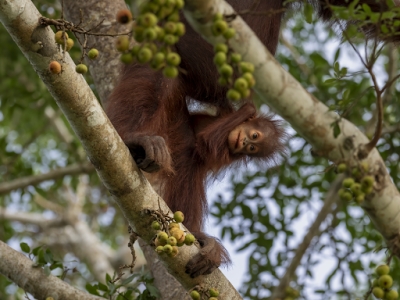KUALA LUMPUR, Aug 1 — Most visitors to Sabah’s Bukit Piton Forest Reserve (formerly known as Northern Ulu Segama Forest Reserve) are rewarded by frequent sightings of orangutans but what they don’t know is how much work went into ensuring this.
Back in early 2000, the forest was badly degraded due to forest fires and timber harvesting. The Sabah Forestry Department (SFD) together with SD Guthrie Berhad embarked on a habitat reforestation initiative in 2008.
“Together with Yayasan Sime Darby (YSD), we partnered with SFD in 2008 to restore an orangutan habitat conservation site in Bukit Piton Forest Reserve in Sabah. The project which covered a total area of 11,612 hectares in the Ulu Segama-Malua Sustainable Forest is an important area for orangutan conservation efforts.
“It houses the largest orangutan population in Sabah with around 3,500 to 4,000 individuals. The project has resulted in the substantial increase of naturally occurring orangutan nests in the area,” said a spokesman for SD Guthrie.
YSD invested RM25 million in the project and today 5,400 hectares of forest have been rehabilitated with 300,000 trees planted – more than 95 species such as indigenous dipterocarps, non-dipterocarps, pioneers and fruit trees – and the orangutans’ habitat restored.
With YSD’s support, the SFD was able to successfully reclassify Bukit Piton Forest Reserve to a Class 1 Protection Forest Reserve from its original status as Class 2 Commercial Forest Reserve.
This means the area is now protected from potential encroachment or redevelopment activities, meaning the land cannot be converted for other purposes.
The orangutans are not the only beneficiaries of this initiative as communities living along Sungai Segama were provided with employment opportunities related to reforestation works.
Also, community-based programmes helped to increase their awareness of the need to conserve forests. These programmes also provided opportunities for members of the community to get involved and improve their livelihood through skill transfer.
At the same time, YSD is also involved in the Human Orangutan Co-existence (HOC) project.
This is to help promote the co-existence of wild orangutans in human-altered environments. HOC will expand outreach efforts to other parts of Sabah, and build awareness both in Malaysia and around the world.
Part of this initiative was the drawing up of a Best Management Practices (BMP) guideline for human-orangutan co-existence in mixed forests.
Together with other companies, YSD has helped restore the habitat within 80 hectares of estate land in Kinabatangan by planting 4,000 native species providing safe spaces and “stepping stone” linkages for orangutans between forest patches within the oil palm estates and nearby forest reserves.
Dr Yatela Zainal Abidin, CEO of YSD, has been reported saying how important it is to ensure humans and wild orangutan populations co-exist for many generations to come.
At the same time, YSD is also supporting the Sabah Wildlife Department’s (SWD) Rapid Response Teams (RRT) with a sponsorship of RM3.8 million for a period of three years from 2022 to 2025. This follows YSD’s support for the expansion of the SFD’s Protect Unit from 2019 to 2021.
The RRT consists of rangers trained to effectively reduce wildlife crimes in Sabah. These rangers were recruited across Sabah including Semporna, Ranau, Lahad Datu, Kinabatangan and Tenom districts.
This is to help increase the capacity and effectiveness of SWD’s response to wildlife poaching and illegal wildlife trade in targeted areas.
“Yayasan Sime Darby is now working with the Sabah Wildlife Department and Danau Girang Field Centre to further combat wildlife poaching and trafficking by complementing the existing 60 rangers from SWD with additional boots on the ground for improved intelligence and response activities,” said Dr Yatela.
YSD and the Tropical Rainforest Conservation and Research Centre (TRCRC) also collaborated to set up a site to help protect Malaysia’s endangered tree species.
It has over 15,000 saplings, mostly threatened tree species, grown from seeds TRCRC has collected to propagate and restore degraded forests.
Many tropical tree species in Malaysia face the risk of extinction due to forest degradation, fragmentation and land use change.
TRCRC rescues these endangered tree species, nurtures them and then uses the seedlings to restore Malaysia’s forests.

